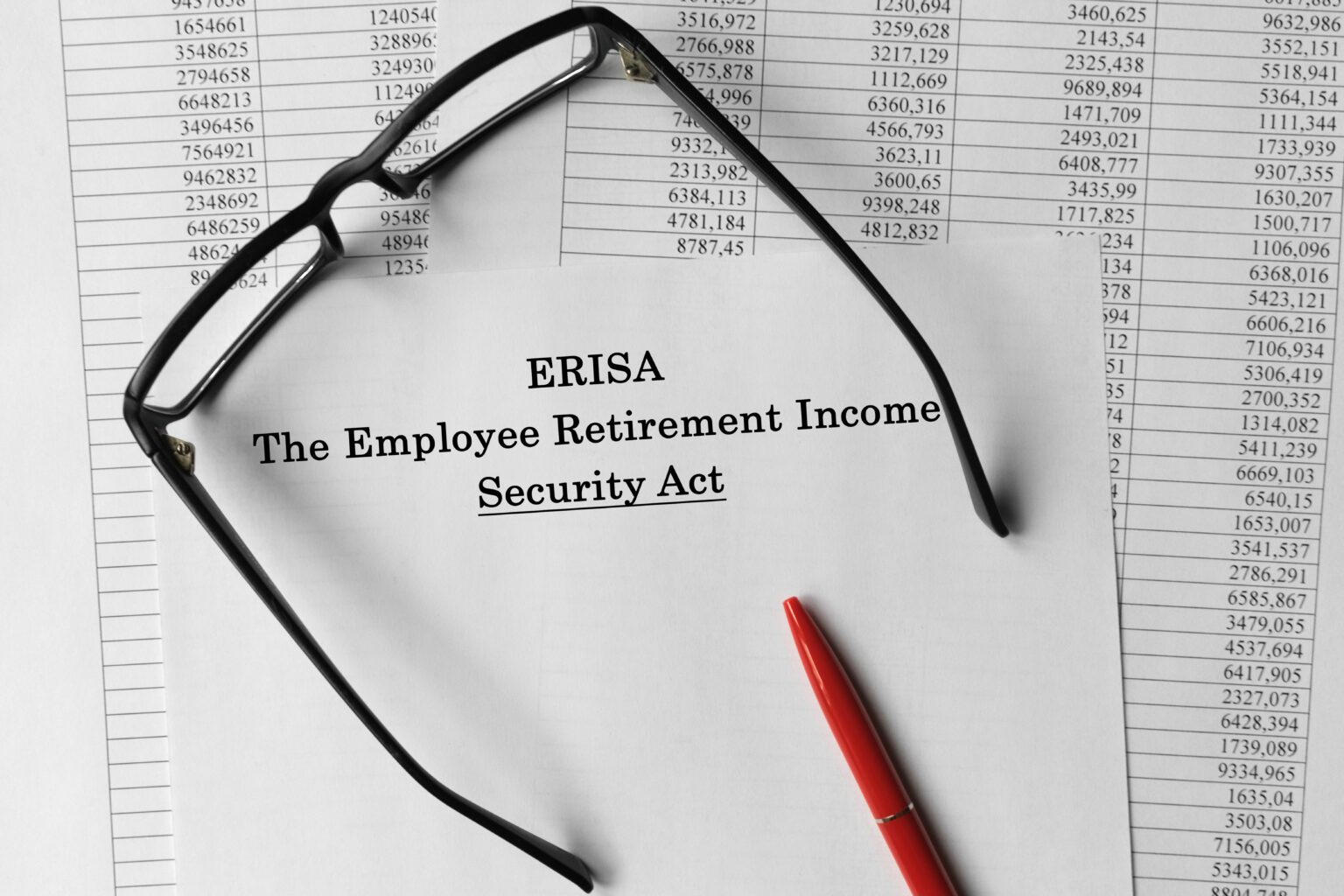Ensuring ERISA compliance is crucial for every practice. This law mandates healthcare providers to observe transparency and accuracy in their financial transactions, particularly involving claims and reimbursements.
Unfortunately, the ERISA standards for medical billing are often uncharted territory for many medical practices. But with this brief guide, you can have a preview of how this law works. We will also discuss how it could impact your practice’s health benefits, EOB, claim payments, revenue cycle, and more.
Understanding ERISA for medical billing


ERISA stands for Employee Retirement Income Security Act. It’s a federal law enacted in 1974 that primarily rules employee benefit plans offered by private employers. While ERISA was initially intended to regulate retirement plans, it has since expanded. It now includes other employee benefits such as health insurance.
In medical billing and coding, ERISA compliance is adherence to the regulations set by the Department of Labor (DOL). It also follows rules from the Internal Revenue Service (IRS) regarding employee health benefit plans.
With this, it ensures that your practice complies with the legal requirements of offering employee health benefits. This is in terms of eligibility, coverage, claims procedures, disclosures, and fiduciary responsibilities.
Key components of ERISA in medical billing
Firstly, ERISA mandates comprehensive plan documentation, including plan documents, Summary Plan Descriptions (SPDs), and participant disclosures. These documents must accurately outline the terms and conditions of the health benefit plans. Also, it should include the rights and obligations of plan participants.
Secondly, ERISA imposes fiduciary responsibilities on those involved in the administration of employee benefit plans. This includes acting in the best interest of plan participants and wisely managing plan assets. Aside from that, fiduciaries must provide accurate and timely information to participants.
In terms of claims processing, ERISA sets specific rules for adjudicating and processing claims related to employee benefit plans. This includes clearly explaining the procedures for handling claims, ensuring timely processing, and providing avenues for appeals or disputes.
The ERISA mandate also includes reporting and disclosure requirements. This requires healthcare providers and plan administrators to submit reports to DOL and plan participants. Also, this includes annual Form 5500 filings, Summary Annual Reports (SARs), and participant disclosures.
Don’t forget that participant rights are also a key component of ERISA. The law ensures that plan participants have access to clear and understandable information about their health benefit plans. It also informs them of their rights and avenues for grievances or disputes related to the plans.
Overall, compliance with ERISA regulations is crucial for medical billing professionals working with employer-sponsored health benefit plans.
The importance of ERISA healthcare compliance
ERISA compliance is paramount for healthcare providers and medical billing companies alike. This is to avoid legal consequences, financial penalties, and reputational damage.
Here’s why your practice should understand the key principles of this law:
- Protects Employee Benefits. ERISA helps safeguard the benefits of employees enrolled in health plans provided by their employers. This means your employees have certain rights and protections when it comes to their health benefits.
- Ensures Legal Compliance. With this law, you can ensure that your health benefit plans are in compliance with federal law. This helps protect your organization from potential legal issues and penalties associated with non-compliance.
- Fosters Transparency. Compliance with ERISA requirements promotes transparency in the administration of health benefit plans. This means that you and your employees can have confidence in the fairness and consistency of how the plans are managed.
- Supports Employee Satisfaction. Compliance demonstrates your commitment to providing valuable and compliant health benefits to your employees. This can positively impact employee satisfaction and retention.
- Mitigates Risks. ERISA compliance helps mitigate the risks associated with potential disputes or challenges related to health benefit plans. By following ERISA guidelines, you can reduce the likelihood of conflicts and ensure smoother plan administration.
- Builds Trust. Complying with this law builds trust with your employees. It shows that you are dedicated to providing compliant and reliable health benefits.
What are the ERISA Compliance Requirements?


To ensure ERISA compliance in medical billing, healthcare providers and medical billing companies must fulfill several key requirements. Below, we give a quick rundown of the key points your practice should know:
1. Plan Document and Summary Plan Description (SPD)
ERISA mandates that employers maintain a written plan document outlining the terms and conditions of their employee benefit plans. This document should describe the benefits provided, eligibility requirements, claims procedures, appeals processes, and other relevant details.
Additionally, your practice must provide employees with an SPD. This summarizes the plan document in a language easily understood by participants.
2. Fiduciary Responsibilities
This act also imposes fiduciary responsibilities on those who manage or control plan assets or administer the plan itself.
Fiduciaries must act solely in the best interests of plan participants and beneficiaries, following certain standards of conduct. They are required to manage plan assets and diversify investments. At the same time, they should disclose necessary information to participants and avoid conflicts of interest.
3. Reporting and Disclosure
Employers like you must submit various reports to the DOL and provide certain disclosures to plan participants. These reports include Form 5500, which provides information about the plan’s financial condition and operations.
Aside from that, you must provide participants with plan-related information. This includes insurance contracts, annual summaries of material modifications, and a summary of benefits and coverage.
4. Claims Procedures
ERISA lays out specific requirements for processing and appealing claims made by plan participants. These requirements include timely acknowledgment of claims and providing written explanations for claim denials. Also, you should offer participants an opportunity to review and appeal and maintain reasonable claims processing timeframes.
5. Nondiscrimination Rules
ERISA prohibits discrimination in favor of highly compensated employees or key individuals regarding eligibility, contributions, or benefits under an employee benefit plan.
With this, you must ensure that employee health benefit plans do not unfairly favor certain employees. It’s important to avoid bias based on their compensation or positions within the organization.
Consequences of Non-Compliance
Non-compliance with ERISA can have significant financial implications for healthcare practices. Here are some of the possible repercussions if your practice neglects this regulation:
- Penalties and Fines. The DOL has the authority to impose civil penalties for ERISA violations. You should note that these penalties can range from several hundred dollars per day for minor violations. But for serious violations, penalties can be tens of thousands of dollars per day.
- Restitution and Reimbursement. If a participant’s benefits were improperly denied or mishandled due to non-compliance, they may be entitled to restitution. They may also demand reimbursement from your practice. This can involve paying back benefits, medical expenses, legal fees, and other costs incurred by participants.
- Legal Fees. Lawsuits or facing DOL investigations can be expensive for any practice, big or small. It’s because your healthcare organization may need to hire legal counsel to navigate these legal challenges. Mind you, legal fees can quickly escalate, especially if cases go to trial.
- Loss of Trust. Failing to comply with ERISA regulations can erode trust among employees and participants. This loss of trust can impact the overall perception of patients to your healthcare practice.
Challenges healthcare providers face in maintaining ERISA Compliance
ERISA rules and medical claims are not an easy mix. Compliance to these rules are one thing, but maintaining it is a different story. In that case, here are the most common dilemmas practices like yours often face:
- Complex Regulations. ERISA regulations can be complex and difficult to navigate. Healthcare providers need to have a thorough understanding of the requirements and ensure compliance with various provisions. This includes reporting and disclosure requirements, fiduciary responsibilities, and claims procedures.
- Changing Laws and Regulations. The healthcare industry is subject to constant changes in laws and regulations. This is why your practice needs to stay updated with any changes in ERISA regulations to ensure compliance. This often requires ongoing monitoring and adapting to new requirements.
- Coordination with Multiple Stakeholders. You often need to coordinate with various stakeholders to ensure ERISA compliance. This includes insurance carriers, third-party administrators, and plan sponsors. This can involve managing communication, data sharing, and coordinating efforts to meet compliance requirements.
- Employee Education and Communication. ERISA requires healthcare providers like you to provide clear and understandable information about employee benefit plans to participants. You should ensure effective employee education and communication even if it’s a challenge.
- Benefit Plan Design Changes. Changes to benefit plan design can impact your ERISA compliance. You need to review and assess the potential implications of these changes and make necessary adjustments to maintain compliance.
How our medical billing experts can help with ERISA compliance
Navigating the complexities of ERISA compliance can be challenging for healthcare providers. Fortunately, you can always seek medical billing expert assistance from experts like Med Financial Solutions. Here’s how we can help:
1. Expert Knowledge and Experience
Companies like us who offer professional medical billing services have deep knowledge and experience in navigating the intricate regulations associated with employee health benefit plans.
Aside from providing revenue cycle management, we also stay up-to-date with changes in legislation. This is to ensure that our clients remain compliant at all times.
2. Plan Document Creation and Maintenance
Creating and maintaining a comprehensive plan document that satisfies ERISA requirements can be overwhelming for healthcare providers. A medical billing company can assist in drafting the plan document and keeping it updated as per regulatory changes. This includes eligibility criteria, coverage details, claims procedures, and appeals processes.
3. Claims Processing and Appeals Management
ERISA requires proper claims processing and appeals management to safeguard the rights of plan participants. In this case, medical billing consulting services can offer robust systems to handle claims efficiently. We ensure accurate medical coding, submission of claims within specified timeframes, and appropriate documentation to support claim decisions.
4. Compliance Audits
Regular compliance audits are essential to identify any gaps or areas of improvement in ERISA compliance. This is why we provide assistance in conducting thorough audits of employee health benefit plans. We will review plan documents, claims procedures, reporting obligations, and other compliance aspects to mitigate risks proactively.
5. Training and Education
We can also offer training and educational resources to healthcare providers regarding ERISA compliance. We keep your staff updated on changes in regulations and the best practices for claims processing. Our experts can also teach about appeals management and other relevant topics. This helps ensure that all your staff members are well-informed about the ERISA patient billing guidelines for compliance.
6. Data Privacy and Security
Our medical billing experts can assist you in implementing robust data privacy and security measures. This is to protect sensitive personal health information (PHI) as required by ERISA. We can help establish appropriate data storage protocols, access controls, and ensure compliance with HIPAA regulations.
Ensure compliance with the help of Med Financial Solutions
ERISA is just one of the many laws and regulations that govern your practice. As much as compliance can be overwhelming, it’s a must to avoid penalties and legal complications.
With MFS, you’ll get expert revenue cycle management services to reach and maintain compliance with various regulations. We also offer credentialing and payer enrollment as a one-stop financial solution for your practice.







